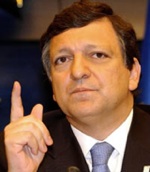
The European Commission president Jose Manuel Barroso kissed babies and pressed the flesh in an Irish-style political canvas, hours after threatening serious repercussions for Ireland if the Lisbon Treaty is not approved in the October 2 referendum.
The 26 Counties could lose its right to nominate an EU commissioner if it rejects the Lisbon Treaty for a second time, he warned -- despite the fact that the Treaty calls for its removal.
“For investor confidence, it is important that there is certainty about the future of Ireland in the EU,” said Mr Barroso.
Mr Barroso insisted he was not threatening the Irish people, but wanted to explain the consequences of a second No.
Mr Barroso, who was “re-elected” for a second five-year term as commission president on Wednesday, said Irish people had benefited enormously from EU membership and made a very important contribution to Europe.
He rejected criticism he was interfering in a national debate. “The European Commission has not only the right but a duty to inform, as any public authority. I believe we would be criticised if we were not informing citizens of what we are doing and about the reality of Europe,” he said.
Any claim that Lisbon could bring about a reduction in Ireland’s minimum wage was “absurd”, he said. “It’s so absurd, I don’t know what to say. This is a lie. It’s a lie. It’s a lie.”
He claimed Europe would look after Ireland’s economic interests during the current crisis -- but pledged only a small amount of money to assist those recently unemployed by Dell, a US multinational which is shuttering operations in Limerick.
“As the Taoiseach and [Ireland’s EU Commissioner] Charlie McCreevy have said, now is not the time to gamble. And Charlie McCreevy knows a lot about this issue of gambling.”
A protest comprising members of Sinn Fein, the Socialist Party, Say NO To Lisbon campaign and peace activists was held outside Limerick City hall Saturday to coincide with Barroso’s visit.
Sinn Fein Councillor Maurice Quinlivan personally expressed to Mr Barroso his disappointment at the timing of his visit to Ireland as its represents a blatant interference by the EU commission in the Lisbon Treaty Referendum campaign.
Quinlivan said: “Whilst I welcomed Mr. Barroso to Limerick I expressed my disappointment at the timing of his visit as its represents a blatant interference by the EU commission in the Lisbon Treaty Referendum campaign. I also expressed the view that the EU Commission and Union has not respected the views of the Irish people on Lisbon as expressed in the referendum last year and I put forward to him the Sinn Fein view that the Treaty being voted on this year is exactly the same one as was rejected by the Irish people last year without any change.”
Quinlivan further commented: “I am happy with the progress of our campaign and on our canvass we are getting strong support for the NO side. There is just under two weeks to go and it is all to fight for. The result is by no means a foregone conclusion.”
In an alternative guilde to the Lisbon referendum launched at the weekend, Sinn Fein said the same issues arose despite the so-called “guarantees” secured by the coalition overnment which have no legal effect.
It says there are five reasons for saying no: it is a bad deal for Ireland; it reduces Ireland’s power in the EU; makes the economic crisis worse by forcing through policies that caused the recession; erodes neutrality by drawing us into a common defence; and removes our right to a referendum on future changes to existing treaties.
It also points out that the treaty gives the EU more than 100 additional powers across a wide range of policy areas with the loss of 60 votes for individual member states.
Meanwhile, at a press conference for ‘Women Say No to Lisbon’, Carol Fox of the Peace and Neutrality Alliance (PANA) stated that Ireland’s Defence Bill should be “setting off alarm bells”.
“Dail and Government approval will now be required before Ireland can be involved in certain armaments programmes, but the guidelines for that approval are nonsensical: the Government will support weapons systems and capabilities that will enhance ‘UN mandated missions engaged in peace keeping, conflict prevention or the strengthening of international security’.”
“Short of nuclear weapons, this could apply to nearly any weapons system in the world”, stated Ms Fox.
![[Irish Republican News]](https://republican-news.org/graphics/title_gifs/rn.gif)
![[Irish Republican News]](https://republican-news.org/graphics/title_gifs/harp.gif)

